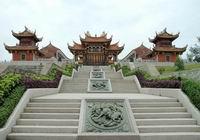A-Ma village lies on a 170-meter peak on a mountaintop on Macau's Coloane Island, a 7,000 square meters cultural complex celebrates the beloved deity's legend. As a tourist, you will find your trip to the A-Ma village both pleasant and culturally rewarding.
The development of the A-Ma Cultural Village was started in 2001 during the Chung Yeung festival shortly after the A-Ma Cultural and Tourism Festival of Macau. Its construction with the Qing Dynasty-style complex. The village comprises a bell tower, drum tower, carved marble altar in the A-Ma Palace, a dressing hall, museum and shops will attract lots of A-Ma devotees and interested tourists, especially those from the Mainland, Taiwan, Hong Kong and Fujian Province, where the goddess A-Ma is believed to have been born over 1,000 years ago.
The statue of the goddess A-Ma is close to the world's tallest.

Tourists approach the village by six rows of stairs carved with auspicious Chinese patterns like of the roaring tiger, the double lion, the five cranes and double phoenix that lead to the Tian Hou Palace. In the village, there are also vegetarian restaurant and more Macanese and Taiwanese snack stalls, folk handicrafts and souvenir shops and other tourist facilities.
The village is surrounded by a park, and is reached by the Estrada do Alto de Coloane which begins just south of Seac Pai Van Park. The road leads first to the parking area for the newly-developed Recreational Fishing Zone, the Arboretum (which features more than 100 species of local and exotic trees), and the main access to the Coloane Hiking Trail. It continues on to the top of the Peak where there is another car park, the new Alto de Coloane picnic area, and the statue of the Goddess A-Ma. Visible from far out in the South China Sea, the statue crowns Coloane Peak. A-Ma is venerated by fishermen and sailors and therefore has always had a special significance in Macau.
There are about 200 million devotees of the goddess worldwide, mainly concentrated in places like South East Asia, Mainland China, Taiwan, Hong Kong and Japan but found even as far away as Europe and the Americas, making them followers of one of the world's most widespread religions.
